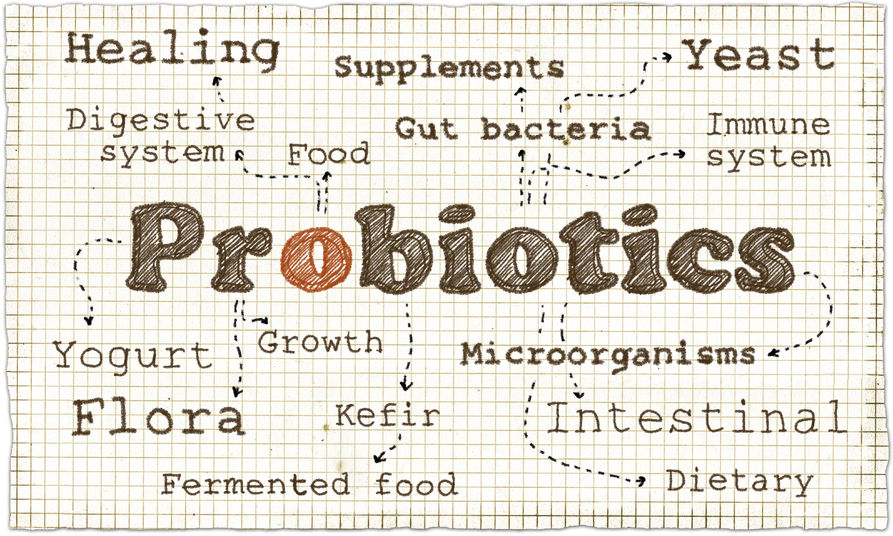Gastrointestinal problems? Many of us try probiotics to relieve the symptoms. But do they really work?
There’s Little Evidence That Probiotics Help Most GI Symptoms
• A new physician guideline recommends using probiotics for only a limited number of gastrointestinal (GI) conditions.
• Probiotics are live microorganisms that are intended to provide health benefits.
• The human gut contains hundreds of different species of bacteria. These interact in complex ways, both with each other and with the human body.
Probiotics are a booming business, consumed by millions of health-conscious Americans in pill form, fermented foods like yogurt, or other food products.
But a new guideline by the American Gastroenterological Association cautions that there’s not enough scientific evidence to recommend using these so-called good bacteria and yeasts to treat most digestive diseases.
Guideline Panel Chair Dr. Grace L. Su, a gastroenterologist at the University of Michigan, explains:
• While our guideline does highlight a few use cases for probiotics, it more importantly underscores that the public’s assumptions about the benefits of probiotics are not well-founded.
• Also, and there is also a major variation in results based on the formulation of the probiotic product.
Probiotics Helpful For Only Certain Conditions
Probiotics are live microorganisms that are intended to provide health benefits. Some probiotics are available by prescription in certain countries, but most are sold over the counter.
In the United States, probiotics marketed as dietary supplements don’t need preapproval from the Food and Drug Administration (FDA), but companies aren’t allowed to make health claims about these products.
Although we sometimes think of bacteria as harmful “germs,” our stomach and intestines actually contain millions of helpful bacteria and yeast. Together, they form a community known as the gut microbiome.
The human gut contains an estimated 300 to 500 different bacterial species. These interact in complex ways, both with each other and with the human body.
In addition to the guideline, the AGA released a technical review of existing scientific studies on the link between probiotics and gut health. This review found that probiotics may be beneficial for some gastrointestinal (gut-related) conditions.
• Certain probiotics may be helpful for preterm, low-birthweight infants — shortening the number of days they spend in the hospital and reducing the time for them to take full feeds.
• Specific probiotics may also reduce the risk of Clostridium difficile infection in adults and children taking antibiotics. C. difficile is a bacterium that causes diarrhea and inflammation of the colon.
• The review found that certain probiotics may be helpful in the management of pouchitis, a complication of ulcerative colitis that has been treated surgically.
For other conditions, the review found that there was a shortage of scientific evidence to support the use of probiotics.
According to Dr. Su:
• Patients taking probiotics for Crohn’s, ulcerative colitis or irritable bowel syndrome should consider stopping.
• The supplements can be costly and there isn’t enough evidence to prove a benefit or confirm lack of harm.
Benefits Depend on Specific Probiotic Strains
One strength of the AGA’s review is that it considered the effect of single-strain or multistrain probiotics on gut health separately, rather than lumping them all together as “probiotics.”
Dr. Daniel J. Merenstein, a professor of family medicine at Georgetown University, and his colleagues wrote recently in the Journal of Family Practice that the benefits of probiotics depend on the strain, dosage, and condition being treated.
• Just as we know that not all antibiotics are equally effective for all infections, so, too, effectiveness among probiotics can — and often does — vary for any given condition.
• Effectiveness also may vary from patient to patient.
• Physicians recommending probiotics for their patients should look to the scientific evidence, where available, for which probiotics to use.
• Simply recommending that a patient ‘take probiotics’ is not particularly helpful when the individual wants a product that will aid a specific condition.
• While probiotics are generally safe, as living bacteria they can cause harm in some circumstances, especially in people with compromised immune systems.
Some people use probiotics to improve their gut health, but research also shows that diet can modify the composition of the gut microbiome.
In particular, low-fat, high-fiber diets can have a beneficial effect, not just on the microbiome but also on your overall health — two aspects of your body that are intimately connected.
Click here to read full article about probiotics and gastrointestinal upset.






